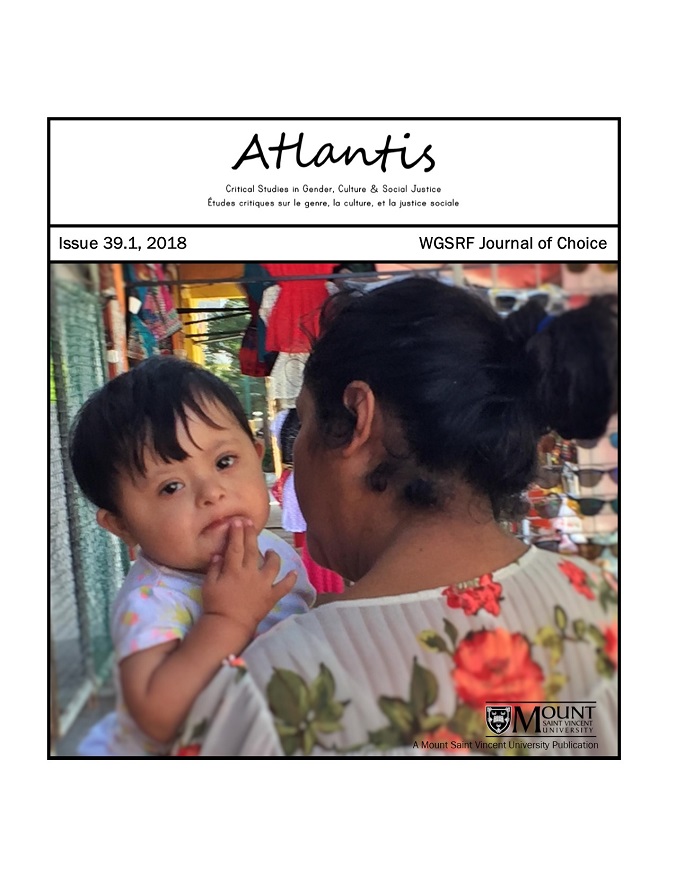The Black Woman Native Speaking Subject: Reflections of a Black Female Professor in Canada
Keywords:
Blacks in Canada, Caribbean diaspora, gender representationsAbstract
This paper interweaves literary and feminist theories alongside personal life stories to demonstrate the collapse of the boundaries of the personal and the intellectual in the pedagogical practices of Black female professors. The paper suggests that acknowledging the precariousness of performing one’s Blackness in university classrooms presents new possibilities for shared learning.
Résumé
Cet article entrelace des théories littéraires et féministes avec des récits de vie personnels pour démontrer l’effondrement des frontières entre la sphère privée et le domaine intellectuel dans les pratiques pédagogiques des femmes professeures noires. L’article suggère que la reconnaissance de la précarité de la manifestation de la négritude dans les classes d’université présente de nouvelles possibilités d’apprentissage partagé.
References
Bannerji, Himani. 2000. The Dark Side of the Nation: Essays on Multiculturalism, Nationalism, and Gender. Toronto: Canadian Scholar’s Press.
Brand, Dionne. 2001. A Map to the Door of No Return: Notes to Belonging. Toronto: Vintage Canada.
____. 2000. At the Full and Change of the Moon. Toronto: Vintage Canada.
Brodber, Erna. 1990. “Fiction in the Scientific Procedure.” In Caribbean Women Writers: Essays from the First International Conference, edited by Selwyn Cudjoe, 164-168. Wellesley: Calaloux Publications.
____. 1980. Jane and Louisa Will Soon Come Home. London: New Beacon Books.
____. 1994. Louisiana. London: New Beacon Books.
____. 2004. Woodside, Pear Tree Grove P.O. Kingston: University of West Indies Press.
Clifford, James. 1997. Routes: Travel and Translation in the Late Twentieth Century. Cambridge, Massachusetts: Harvard University Press.
Combahee River Collective. 1978. “A Black Feminist Statement.” In Capitalist Patriarchy and the Case for Socialist Feminism, edited by Zilla R. Eisenstein, 210-218. New York: Monthly Review Press.
Cotterill, Pamela, and Gayle Letherby. 1993. "Weaving Stories: Personal Auto/Biographies in Feminist Research." Sociology 27 (1): 67-79.
Danticat, Edwidge. 1994. Breath, Eyes, Memory: A Novel. New York: Vintage Books.
Davies, Ioan. 2000. “Theorizing Toronto.” Topia: Canadian Journal of Cultural Studies 3 (Spring): 14-36.
Fine, Michelle. 1992. Disruptive Voices: The Possibilities of Feminist Research. Ann Arbor, Michigan: University of Michigan Press.
Freire, Paulo. 2000. Pedagogy of the Oppressed. New York: Continuum.
Hanisch, Carol. 2000. “The Personal is Political.” In Radical Feminism: A Documentary Reader, edited by Barbara A. Crow, 113-116. New York: New York University Press.
hooks, bell. 1994. Teaching to Transgress: Education as the Practice of Freedom. New York: Routledge.
Lorde, Audre. 1984. Sister Outsider. California: Crossing Press.
MacKinnon, Catherine A. 1982. “Feminism, Marxism, Method and the State: An Agenda for Theory.” Signs 7 (3): 515-544
Magda, Lewis. 2005. “More Than Meets the Eye: The Under Side of the Corporate Culture of Higher Education and Possibilities for a New Feminist Critique.” Journal of Curriculum Theorizing 21(1).
Marable, Manning. 1995. Beyond Black and White: Transforming African-American Politics. London: Verso.
Philip, NourbeSe M. 1990. “Managing the Unmanageable.” In Caribbean Women Writers: Essays from the First International Conference, edited by Selwyn Cudjoe, 295-300. Wellesley: Calaloux Publications.
Smith, Malinda S. with Kimberly Gamarro and Mansharn Toor. 2017. “A Dirty Dozen: Unconscious Race and Gender Biases in the Academy.” In The Equity Myth: Racialization and Indigeneity at Canadian Universities, by Frances Henry, Enakshi Dua, Carl E. James, Audrey Kobayashi, Peter Li, Howard Ramos, and Malinda S. Smith, 263-296. Vancouver and Toronto: UBC Press.
Swan, Elaine. 2008. “Let’s Not Get Too Personal: Critical Reflection, Reflexivity, and the Confessional Turn.” Journal of European Industrial Training 32 (5): 385-399.
Downloads
Published
Issue
Section
License
Copyright (c) 2018 Atlantis: Critical Studies in Gender, Culture & Social Justice

This work is licensed under a Creative Commons Attribution 4.0 International License.
Authors who publish with this journal agree to the following terms:
1. Authors retain copyright and grant the journal right of first publication, with the work simultaneously licensed under a Creative Commons Attribution 4.0 International License that allows others to share the work with an acknowledgement of the work's authorship and initial publication in this journal.
2. Authors are aware that articles published in Atlantis are indexed and made available through various scholarly and professional search tools, including but not limited to Erudit.
3. Authors are able to enter into separate, additional contractual arrangements for the non-exclusive distribution of the journal's published version of the work (e.g., post it to an institutional repository or publish it in a book), with an acknowledgement of its initial publication in this journal.
4. Authors are permitted and encouraged to preprint their work, that is, post their work online (e.g., in institutional repositories or on their website) prior to and during the submission process. This can lead to productive exchanges, as well as earlier and greater citation of published work. Read more on preprints here.







